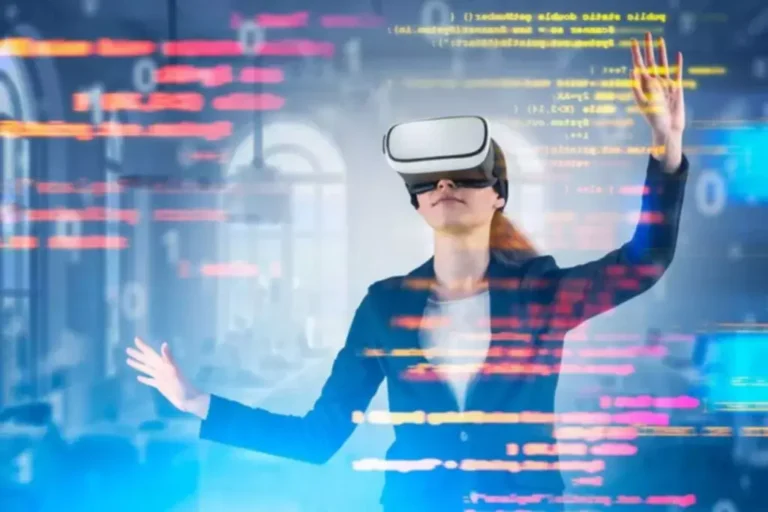5 Most Popular Coding Languages in VR Programming

Programming languages are virtual structures that programmers implement to interact with machines. It is a series of instructions created in a specific language to solve problems. Virtual Reality (VR) technology is advancing rapidly, transporting users to fantasy worlds with a simple VR headset. The requirements of virtual reality are becoming more and more stringent, which leads to the emergence of new technologies and libraries. Let’s discuss which VR programming languages remain relevant in the face of new trends.
Why is VR programming necessary?
Programming in VR is the process of creating engaging, interactive digital universes. This work involves designing, developing, releasing, and adopting programs supported by unique VR gadgets and apps. Consider the main reasons why you should pay attention to VR programming:
- The VR field is experiencing active development: the international virtual reality area was valued at $28.41 billion in 2022 and is projected to reach $62.1 billion by 2027. At the same time, the annual increase rate will be 21.6%.
- The career prospects are staggering: as the VR field develops, the demand for professional developers increases. According to a study by Burning Glass Technologies, between 2019 and 2022, the number of job adverts for VR specialists increased by 93%.
- Virtual reality apps radically change industries, from entertainment to medicine to education. VR specialists can work on revolutionary digital products that change the lives of all humanity.
- Low market saturation: Quest Store VR games have an average of 1,532 reviews, which can be estimated at $3,000,000 in profit (average VR entertainment costs $14.75).
Enterprises use VR coding to provide collaboration, studying, product design, and presentation. At the same time, you must remember virtual reality demands computing resources and involves using high-end machines to assess its potential.

We are confident that we have what it takes to help you get your platform from the idea throughout design and development phases, all the way to successful deployment in a production environment!
Most famous programming languages in the VR industry
There is no single answer to which programming language is optimal when developing virtual reality. It depends on many factors, including your development experience, your chosen VR system, and the application specifics you plan to build. Let’s analyze the most suitable solutions in this industry.
C#
It is one of the most optimal choices. Specialists employ it to generate Unity content, which is the famous game engine. Implementing such a structure allows an application to work on different devices, from PC to Mac, creating universal programs to run on Android and iOS. Many modern VR applications are written in Unity.
Suppose you haven’t mastered such a VR programming language. In that case, Unity has in-house designers, so you can quickly get the advice you need and use the advanced development features created by Unity’s experts.
C# in the VR area is linked to the Unity framework. So, you can use the StereoKit library when releasing VR extensions that you can add to an existing product. Combined with .NET libraries, this makes it simpler to shape digital environments.
С++
Such a language was created in 1985 and is still considered one of the most effective and straightforward in game programming.
This optimized code guarantees precise memory management, which is essential when releasing high-resolution content and many polygons.
C++ is an attractive entertainment solution for ripple-A (AAA) titles and independent content. The C++ structure is suitable for various game engines, including Unity or Unreal, making it popular among developers. So, the Oculus Rift PC SDK was written in C++.

Python
Python is considered the simplest virtual language, so it is suitable for programmers just starting to interact with VR. Since this structure is easy to understand, it allows users to implement ideas with a minimum number of lines of code. Developers can quickly create VR projects with unique packages that are linked to Python (it has unique loading and troubleshooting methods)
If you need more features, you’ll find it easier to move to more advanced frameworks like C# when you have a deep knowledge of Python.
The Vizard platform is a famous instance of using Python in VR software development. Such a solution allows you to create high-quality VR products so research centers, universities, and NASA actively use it.
Java
Java was developed by Sun Microsystems, which now owns Oracle. Such an object-oriented language is easily adapted to the needs of VR programs.
Java is particularly useful in generating structures such as language processing, search, and neural network algorithms, a vital element of any VR application.
Although some experts call Java an outdated language, it is still actively used when working with VR. It is one of the first systems used in computer engineering software because it received the high-level parameters needed to form the various components of VR programs. Since the Android system uses Java to make its VR solutions, the Google Cardboard or ViroCore libraries are also built in Java.
Javascript
As we know, Javascript is the language of the Internet. It is an easy-to-learn and attractive virtual language. The JavaScript syntax is similar to the more advanced C system. It has become one of the most common VR languages for gaming projects due to its versatility.
Since this language is synced with various browsers, it is suitable to work with the WebVR platform, which is useful when releasing web VR platforms. If you are trying to find a coding system to deal with web applications, we recommend paying attention to Javascript.
Three.js is the popular 3D JavaScript library that lets programmers create virtual reality software. Another example is the React Native library; specialists adopt it to generate prototypes and create VR digital products with such a solution.
Is VR software development a challenging task?
The complexity of creating digital reality products depends on your programming practice. If you have never dealt with coding or 3D graphics, or VR development, we recommend starting with 2D. When assessing the complexity of a VR project, you should consider the following factors:
- Comprehending how does programming VR work: if you have previously dealt with C# or C++, you will have less difficulty with VR coding. Even if you’re starting from scratch, many programming principles are the same across languages, making learning easy.
- Experience with game engines: Unity and Unreal Engine have unique properties, but online tutorials explain all working moments and active product support. If you have previously worked with systems, you will understand how they work with virtual reality.
- The complexity of systems: the coding complication depends on the amount of work and the project’s scale. Elementary programs such as crucial VR environments are available to new users; however, creating sophisticated multiplayer software with realistic physics can be challenging even for experienced developers.
There are many decisions to be made during the development of VR programs, and if your development department has not previously created digital virtual reality solutions, this can be problematic. If you don’t have the required skill set in-house, you should hire an outside specialist.
Final words
If you are considering which virtual language to choose for VR programming in business, the simplest and most effective options are C# or C++. They are most often chosen to build cutting-edge VR experiences, which is why such structures have formed significant communities whose members will assist you in solving any problem.
The other code languages we blogged about are also reasonable solutions, but they have some limitations regarding the focus group.
To develop a VR product, you don’t even need to hire your own team. The Global Cloud Team is eager to join forces with like-minded innovators. Take the first step towards a future of immersive VR experiences – contact us now, and let’s make magic happen together.
Top Articles
Container vs VM (Virtual Machines): How Do They Differ?
I am here to help you!
Explore the possibility to hire a dedicated R&D team that helps your company to scale product development.






